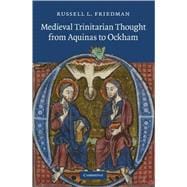
Note: Supplemental materials are not guaranteed with Rental or Used book purchases.
Purchase Benefits
Looking to rent a book? Rent Medieval Trinitarian Thought from Aquinas to Ockham [ISBN: 9780521117142] for the semester, quarter, and short term or search our site for other textbooks by Russell L. Friedman. Renting a textbook can save you up to 90% from the cost of buying.
| Acknowledgments | p. vii |
| List of symbols, abbreviations, and conventions | p. vii |
| Introduction | p. 1 |
| The Trinity and the Aristotelian categories: different ways of explaining identity and distinction | p. 5 |
| Background, and the relation account | p. 6 |
| The emanation account and the foundations of the trinitarian traditions | p. 15 |
| Emerging trinitarian traditions in the late thirteenth century: the case of John Pecham | p. 30 |
| Henry of Ghent and the rejection of the relation account | p. 45 |
| The Trinity and human psychology: "In the beginning was the Word" | p. 50 |
| The psychological model of the Trinity and its proper interpretation | p. 52 |
| Concept theory and trinitarian theology | p. 75 |
| The Trinity and metaphysics: the formal distinction, divine simplicity, and the psychological model | p. 94 |
| The divine attributes, the search for simplicity, and the possibility of trinitarian explanation | p. 94 |
| Peter Auriol | p. 113 |
| Francis of Marchia | p. 120 |
| William Ockham | p. 124 |
| The Trinity, divine simplicity, and fideism-or: was Gilson right about the fourteenth century after all? | p. 133 |
| Fideism, Praepositinianism, and the debate over personal constitution | p. 133 |
| Walter Chatton | p. 146 |
| Robert Holcot | p. 155 |
| Gregory of Rimini | p. 158 |
| Appendix: major elements in Franciscan and Dominican trinitarian theologies | p. 171 |
| Bibliography of primary sources | p. 174 |
| Annotated bibliography of selected secondary literature | p. 178 |
| Index | p. 187 |
| Table of Contents provided by Ingram. All Rights Reserved. |
The New copy of this book will include any supplemental materials advertised. Please check the title of the book to determine if it should include any access cards, study guides, lab manuals, CDs, etc.
The Used, Rental and eBook copies of this book are not guaranteed to include any supplemental materials. Typically, only the book itself is included. This is true even if the title states it includes any access cards, study guides, lab manuals, CDs, etc.